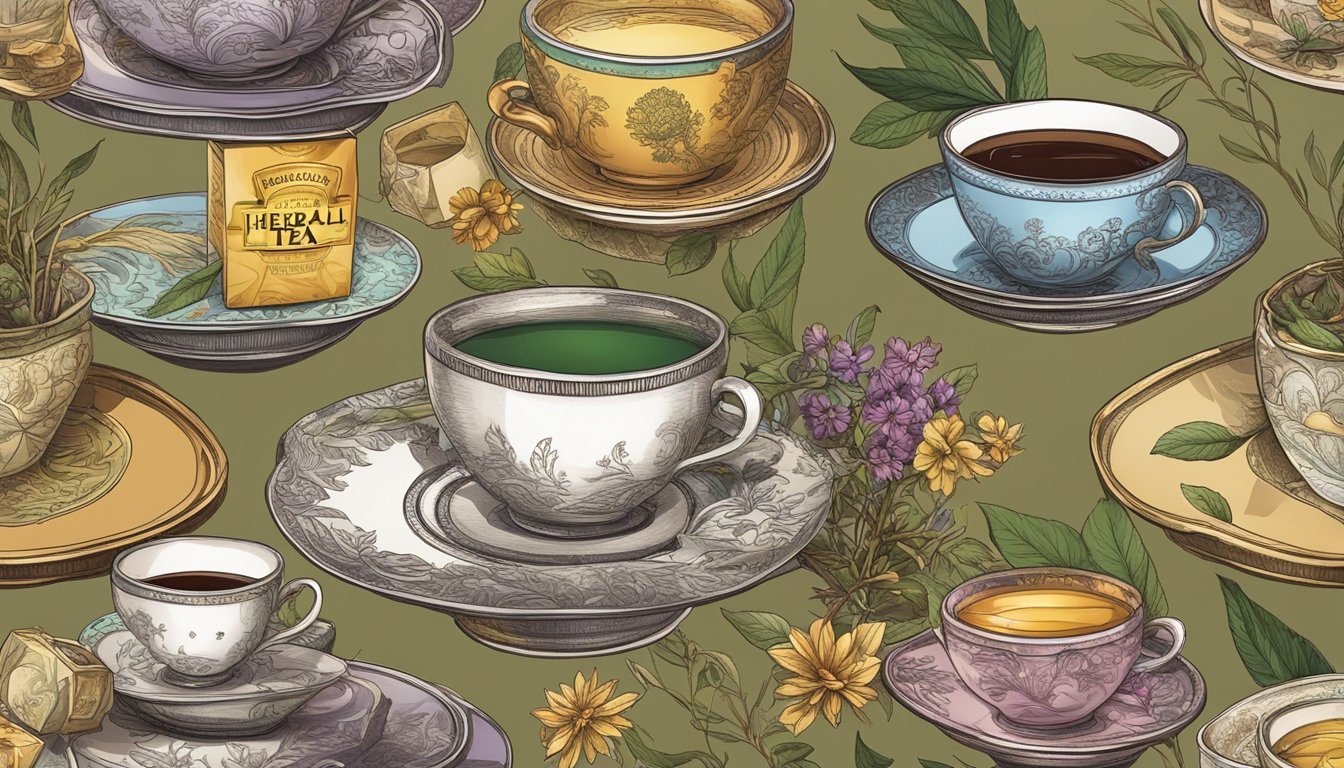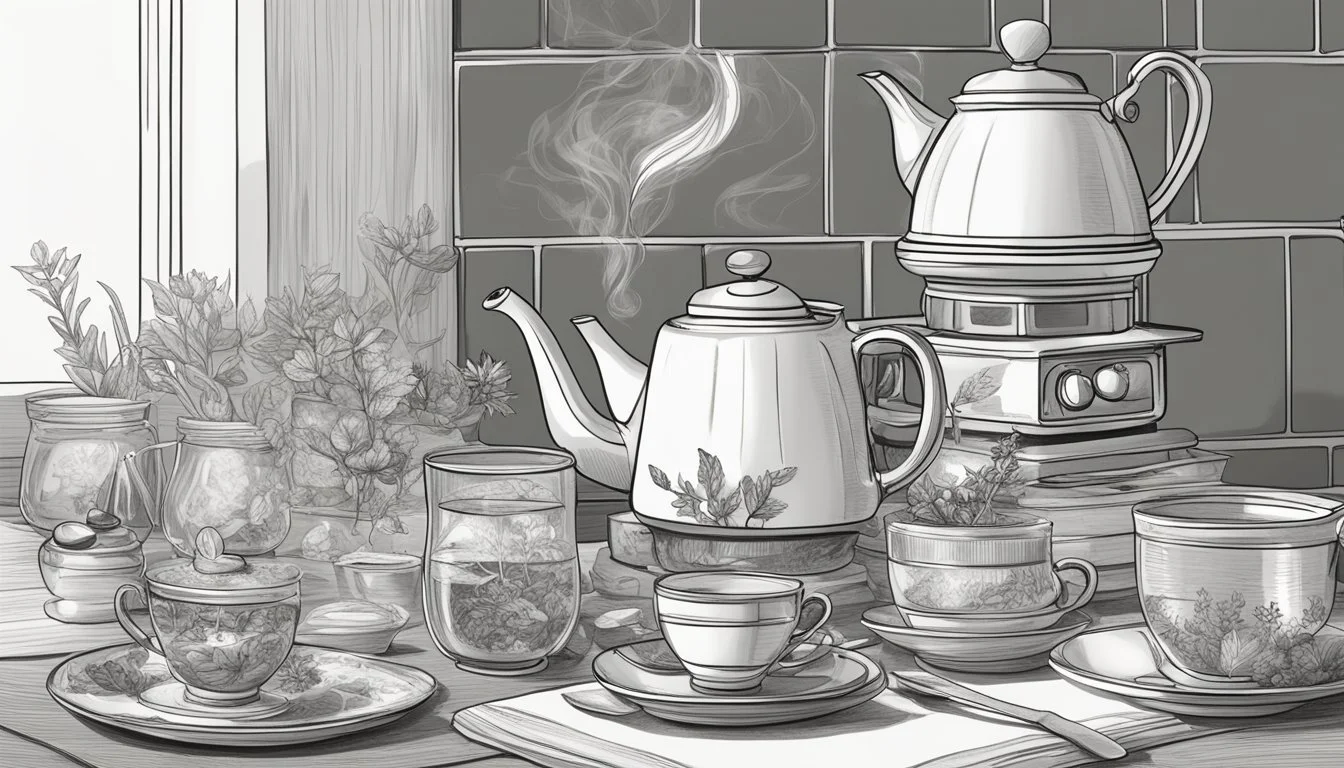How Many Cups of Celestial Seasonings Herbal Tea Per Day Should You Limit?
Drinking herbal tea is a ritual embraced around the world for its soothing qualities and health benefits. Many teas feature a blend of herbs, spices, and botanicals that are not only flavorful but also often cited for their potential to aid digestion, reduce stress, and even improve sleep. A popular brand in this market is Celestial Seasonings, known for offering a wide range of herbal teas. As with any beverage, the key is moderation, and when it comes to herbal tea, the threshold for what constitutes 'too much' can vary among individuals.
The question of how many cups of Celestial Seasonings herbal tea one can safely consume per day is not a one-size-fits-all answer. Although herbal tea is typically low in caffeine and free from many of the stimulants found in other beverages, some of its ingredients, if taken in large amounts, could lead to adverse effects such as headaches, nervousness, or stomach issues. The contents of each blend should be reviewed to ensure that consumption stays within safe limits, particularly for teas containing ingredients with known potency or potential side effects.
While there's general agreement that herbal teas can be part of a healthy diet, it’s advisable to pay attention to how one's body reacts to herbal infusions. Most people can safely enjoy several cups of Celestial Seasonings herbal tea per day. However, it's essential to consider individual health conditions, the presence of any potentially reactive herbal ingredients, and to follow the recommended brewing instructions provided by Celestial Seasonings to avoid any unintended consequences.
Understanding Herbal Tea
Herbal tea, a beverage often celebrated for its natural ingredients and health benefits, represents a tradition steeped in history. Across cultures, diverse varieties of herbal teas have been used for their medicinal properties as well as their range of flavors.
History and Origin
The use of herbs for brewing tea dates back thousands of years, with evidence suggesting that herbal infusions were enjoyed in ancient China and Egypt. Unlike traditional green or black teas, which originate from the Camellia sinensis plant, herbal teas can be blends of various leaves, flowers, roots, and spices. This rich history underpins a modern industry that includes brands like Celestial Seasonings, which continue the tradition of herbal tea.
Different Types of Herbal Tea
Herbal teas come in a multitude of varieties, each with its own profile and benefits:
Chamomile: Known for aiding sleep quality.
Peppermint: Appreciated for its digestion benefits.
Ginger: Used for its anti-inflammatory properties.
Rooibos: Contains antioxidants that may improve heart health.
Lemongrass and Spearmint: Often combined for a refreshing flavor.
Health Benefits of Herbal Tea
Across the varieties, herbal teas share several health benefits:
Antioxidants: May reduce inflammation and improve immune system function.
Digestion: Some herbal teas contain natural ingredients that promote digestive health.
Vitamin C and Blood Pressure: Certain herbs may contribute to improved blood pressure regulation and provide vitamin C.
Recognizing Quality in Herbal Tea
When evaluating the quality of herbal tea, consider:
Freshness: The tea should have a vibrant aroma and taste.
Natural Ingredients: Look for teas with whole pieces of herbs or flowers.
Flavors: High-quality herbal teas offer flavors that are robust and full-bodied without artificial additives.
By understanding these aspects, consumers can appreciate the complexity behind a seemingly simple cup of herbal tea.
Caffeine Content in Herbal Teas
When discussing the consumption of herbal teas, it's essential to consider their caffeine content. Celestial Seasonings offers a range of herbal teas, many of which are naturally caffeine-free, while others, like their green and black teas, contain varying levels of caffeine.
Understanding Caffeine Levels
Herbal teas from Celestial Seasonings are generally caffeine-free, particularly those that are labeled as such. Green and black teas naturally contain caffeine, though the amount varies depending on the specific blend and processing method. Decaffeinated options are available for those sensitive to caffeine or desiring less of it in their diets.
Caffeinated Green and Black Teas: Can contain approximately 25-50 mg of caffeine per 8 oz cup.
Decaffeinated Green and Black Teas: Typically have less than 5 mg of caffeine per 8 oz cup.
Caffeine-Free Herbal Teas: Contain no caffeine, making them suitable for all-day consumption without the risk of caffeine-related side effects.
The company ensures that their caffeine-free teas do not contain even a trace of caffeine, which can provide stress relief and avoid causing dehydration or sleep disturbances.
Effects of Caffeine on the Body
Caffeine can have various effects on the body, ranging from boosting metabolism to increasing blood pressure. It can be beneficial for mental alertness and can temporarily ward off drowsiness. However, excessive consumption might lead to anxiety, headaches, and disrupt sleep patterns.
Positive Effects:
Stimulation of metabolism
Enhanced concentration and alertness
Negative Effects:
Increased heart rate and blood pressure
Potential dehydration
Anxiety and restlessness
One should be mindful of their caffeine intake from all sources, including teas, to maintain heart health and minimize stress on the body. It's always advisable to consult with a healthcare provider regarding appropriate caffeine consumption, especially for individuals with specific health concerns.
Potential Side Effects and Risks
When consuming herbal teas such as those offered by Celestial Seasonings, it's important to be aware of the potential risks and side effects related to overconsumption and individual ingredients.
Navigating Toxic Ingredients
Celestial Seasonings teas generally aim to use safe, natural ingredients. However, toxic ingredients or pesticides can be a concern for consumers seeking organic or all-natural products. Not all herbal ingredients are universally safe; some may be dangerous when consumed in large quantities. For instance, certain teas might contain toxic chemicals if the herbs used were treated with pesticides during growth.
Recognizing Overconsumption Symptoms
Excessive intake of herbal tea can lead to a variety of side effects. Symptoms of overdoing it with Celestial Seasonings herbal teas—or any herbal teas—might include:
Dizziness: A common sign of too much caffeine or certain herbal reactions.
Upset Stomach: Can be caused by the different herbs interacting with stomach acids.
Nausea and Vomiting: Potential reaction to herbs or excessive tea consumption.
Headaches: Certain herbs like valerian, when taken in large quantities, may cause headaches.
Stomach Discomfort: Some ingredients may disrupt the digestive system if ingested excessively.
Maintaining a balanced consumption and paying attention to one's body reactions can help mitigate these symptoms.
Interactions With Medications
Herbal teas can interact with various medications, potentially altering their efficacy or leading to adverse effects. For example, some teas with high levels of iron might interfere with certain medication absorption, while others might amplify the effect of sedative drugs. It's advisable for individuals on medication to consult with a healthcare provider to ensure their tea consumption does not pose a risk.
Guidelines on Consumption
When it comes to the consumption of Celestial Seasonings herbal tea, moderation is key for both safety and maintaining overall health. It is essential to understand the recommended intake and seek medical advice when necessary to prevent any adverse effects such as dehydration, stomach upset, or interference with medications.
Recommended Intake
Adults: Generally, up to 3-4 cups of herbal tea per day are considered safe for most individuals.
Varieties: Some teas contain caffeine or other compounds with stronger effects, hence one should adjust the intake accordingly.
It is imperative to follow the brewing instructions provided by Celestial Seasonings, typically one or two tea bags per 8 ounces of water, and to not exceed the daily recommended limit without consulting a healthcare professional.
Importance of Medical Advice
Individuals with Health Conditions: Those with existing health conditions or who are on medications should first check with a healthcare professional before increasing their herbal tea consumption.
Hydration: Herbal teas can have diuretic properties; thus, it is critical to maintain proper hydration by also consuming an adequate amount of water throughout the day.
The safety of consuming herbal tea can vary based on individual health profiles, and only a qualified healthcare professional can offer personalized advice.
Brewing and Preparation Techniques
Brewing a satisfying cup of Celestial Seasonings herbal tea involves mastering the steeping time and water quality. These two factors significantly influence the flavor and quality of tea.
Optimal Steeping Times and Temperatures
When preparing Celestial Seasonings herbal tea, the optimal steeping time is between 5 to 7 minutes. This duration allows the herbs to fully infuse the water with flavor, without becoming bitter. The use of boiling water—typically around 212°F (100°C)—is recommended for brewing most herbal teas. Here is a succinct guide to the brewing process:
Bring water to a boil.
Pour the boiling water over the tea bag.
Steep for 5 to 7 minutes.
Remove the tea bag and enjoy.
Using water that is too hot or steeping for too long can lead to an overly strong or bitter flavor, which may not be pleasant for all drinkers.
The Impact of Water Quality
The quality of water used in brewing tea can profoundly affect the taste. Tap water with high levels of chlorine or other impurities can impart unwanted flavors to the tea. Therefore, it is suggested to use filtered water or fresh **spring water **to ensure a pure and clean taste profile.
Use filtered or spring water for the best flavor.
Preheat the mug or teapot before adding the hot water to maintain the water temperature during steeping.
These preparation techniques ensure that the tea maintains its intended flavor profile, free from the interference of contaminants commonly found in unfiltered tap water.
Integrating Herbal Teas Into a Healthy Lifestyle
Integrating herbal teas such as those offered by Celestial Seasonings can support wellness goals, from aiding relaxation to potentially assisting in weight management. It's important, however, to consider how they fit into one's overall diet and lifestyle.
Balancing Tea With Diet and Hydration
Herbal teas can be part of a well-rounded diet, offering a wide array of flavors alongside potential health benefits. They are typically low in calories, making them a suitable choice for individuals monitoring their weight, and some studies suggest that certain components like polyphenols might support weight loss efforts. However, these teas should not replace meals or be solely relied on for significant nutritional needs. Additionally, while herbal teas contribute to hydration, they should complement water intake rather than substitute it, as adequate hydration is essential for health.
Alternatives to Herbal Teas
When herbal teas are not preferred or recommended, other beverages like green tea or black tea can be considered. These teas contain caffeine and polyphenols, offering different health benefits such as antioxidants. Moreover, for those who may be looking to further customize their nutritional intake, dietary supplements in the form of capsules, powders, or liquids provide an alternative route. It's crucial to consult a healthcare provider before starting any supplement regimen, ensuring it aligns with personal health needs and goals.
Enhancing Wellness Through Teas
Celestial Seasonings herbal teas have been acknowledged for their calming properties, contributing to relaxation and stress relief. Varieties featuring ingredients like chamomile or peppermint can become part of a sleep-supportive routine due to their relaxing effects. In contrast, incorporating teas into a structured stress relief routine, such as a bedtime ritual or a midday break, can foster an overall sense of well-being. Remember, while teas can aid in wellness, they should not be seen as a cure-all but rather as one component of a holistic approach to health.
Conclusion
When consuming Celestial Seasonings herbal tea, individuals should be mindful of their intake. While herbal teas, including chamomile tea, are known for their soothing properties, excessive consumption can lead to adverse effects such as headaches, nervousness, and sleep disturbances. Herbal teas contain varying compounds that can affect the body differently; thus, what is too much for one person may not be the same for another.
Moderation is key. As a general guideline, three to four cups of herbal tea per day is considered safe for most people. It is essential to listen to one's body and adjust accordingly, as personal tolerance can vary. The following table provides a brief summary:
Herbal Tea Type Safety Potential Side Effects Recommended Daily Limit Celestial Seasonings Herbal Tea Safe for most individuals Headaches, nervousness, stomach issues 3-4 cups
For those who enjoy Celestial Seasonings' chamomile tea or other herbal varieties, it is important to consider not just the quantity but also individual sensitivity to caffeine and other natural substances present within the tea. Furthermore, tea drinkers should ensure a balanced diet and maintain adequate hydration, supplementing their herbal tea consumption with plenty of water.
In essence, enjoying herbal tea in moderation contributes to a varied and balanced lifestyle. Celestial Seasonings offers a range of herbal tea options that can be safely enjoyed by most consumers when respected as a part of a conscientious diet.









